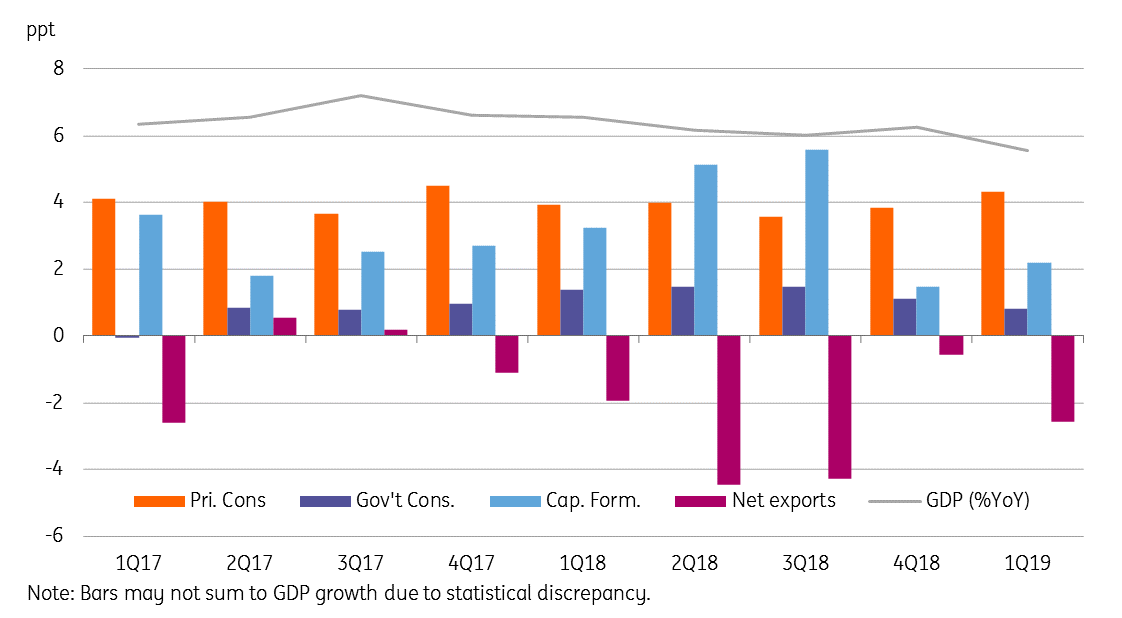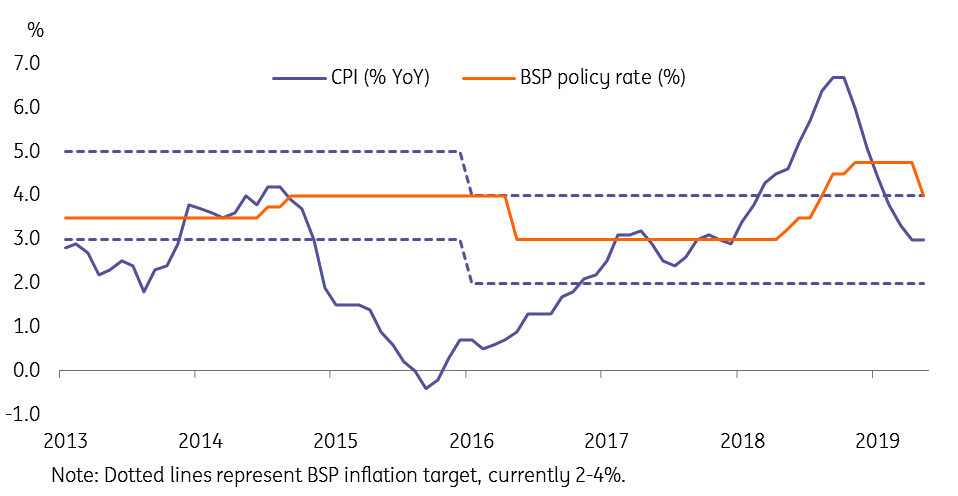Philippine central bank cuts rates as growth dips to 4-year low
The Philippines central bank has joined other Asian counterparts in easing monetary policy today. Although this is unlikely to be an entrenched easing cycle, we anticipate one more policy rate cut later in the year. The earlier the better
| 5.6% |
Philippine GDP growth in 1Q19The lowest in four years |
| Worse than expected | |
1Q19 GDP growth misses estimates
The Philippines posted 5.6% year-on-year GDP growth in the first quarter of 2019, a significant downside surprise against consensus and ING’s estimates of 6.0% and 5.9%, respectively. The 1Q19 figure is a sharp dip from the 6.3% growth in the previous quarter and will go down as the slowest pace of growth in the last four years.
Underlying our below-consensus growth view for the last quarter was weak government spending down to the delayed approval of the budget for the current year. Indeed, government consumption shaved 0.3 percentage points of the headline GDP growth. But the bigger hit, 2ppt, came from net trade. Firmer private consumption and investments offset some of this but not sufficiently enough to keep GDP growth within the government’s 6% to 7% target for the year.
Surprisingly enough, manufacturing not only held up well but also contributed more to the GDP growth than in the previous quarter despite weakening exports. But again, this was more than offset by drags from constriction, utilities, and farm output.
Sources of annual GDP growth

Central bank moves to ease policy
Economic planning secretary Ernesto Pernia expressed confidence that the 6% to 7% growth target for the year was “still achievable, fortunately”. On technical grounds, it's possible as a more favourable base effect at work in the remainder of the year. After accounting for the first quarter dip, our full-year 2019 growth forecast still remains above 6%.
However, the central bank thinks persistent downside growth risks as warranting greater policy support for the economy going forward. They voted to cut the key policy rates by 25 basis points, taking the overnight borrowing rate to 4.50% and the overnight deposit rate to 4.00%. There was no change to the commercial banks’ reserve requirement ratio (RRR), currently standing at 18%.
Inflation has started to firmly settle within the target of 2% to 4% and forecasts are closer to the central bank’s projections - BSP Deputy Governor Diwa Guinigundo.
A move in consumer price inflation back to the 2% to 4% policy target, and policymakers’ expectations of it staying firmly there created space for the rate cut. Although as of now, we don’t see this turning out to be an entrenched easing cycle, an aggressive 175bp policy tightening last year has created ample space for easing this year.
Inflation firmly back in BSP's comfort zone

Our house view has one more 25bp rate cut pencilled in for the fourth quarter for the year, though an earlier cut than that would be a better pre-emptive cushion for the economy amid escalated global trade tensions.
Download
Download article
10 May 2019
Good MornING Asia - 10 May 2019 This bundle contains {bundle_entries}{/bundle_entries} articles"THINK Outside" is a collection of specially commissioned content from third-party sources, such as economic think-tanks and academic institutions, that ING deems reliable and from non-research departments within ING. ING Bank N.V. ("ING") uses these sources to expand the range of opinions you can find on the THINK website. Some of these sources are not the property of or managed by ING, and therefore ING cannot always guarantee the correctness, completeness, actuality and quality of such sources, nor the availability at any given time of the data and information provided, and ING cannot accept any liability in this respect, insofar as this is permissible pursuant to the applicable laws and regulations.
This publication does not necessarily reflect the ING house view. This publication has been prepared solely for information purposes without regard to any particular user's investment objectives, financial situation, or means. The information in the publication is not an investment recommendation and it is not investment, legal or tax advice or an offer or solicitation to purchase or sell any financial instrument. Reasonable care has been taken to ensure that this publication is not untrue or misleading when published, but ING does not represent that it is accurate or complete. ING does not accept any liability for any direct, indirect or consequential loss arising from any use of this publication. Unless otherwise stated, any views, forecasts, or estimates are solely those of the author(s), as of the date of the publication and are subject to change without notice.
The distribution of this publication may be restricted by law or regulation in different jurisdictions and persons into whose possession this publication comes should inform themselves about, and observe, such restrictions.
Copyright and database rights protection exists in this report and it may not be reproduced, distributed or published by any person for any purpose without the prior express consent of ING. All rights are reserved.
ING Bank N.V. is authorised by the Dutch Central Bank and supervised by the European Central Bank (ECB), the Dutch Central Bank (DNB) and the Dutch Authority for the Financial Markets (AFM). ING Bank N.V. is incorporated in the Netherlands (Trade Register no. 33031431 Amsterdam).